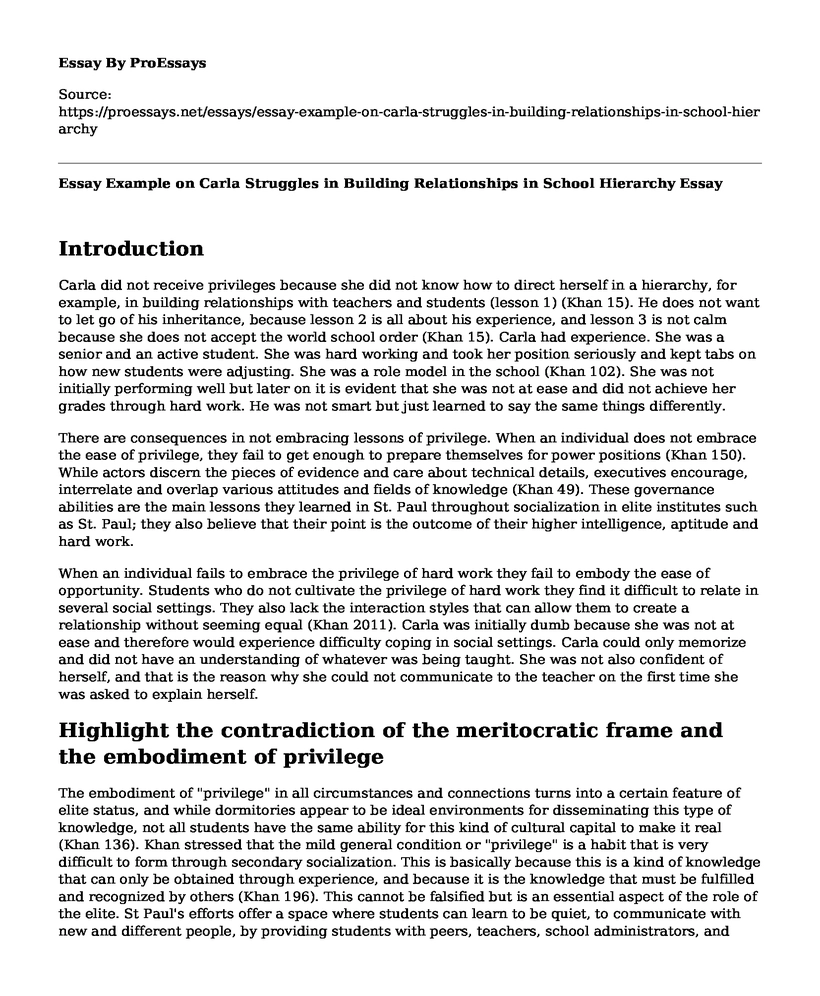Introduction
Carla did not receive privileges because she did not know how to direct herself in a hierarchy, for example, in building relationships with teachers and students (lesson 1) (Khan 15). He does not want to let go of his inheritance, because lesson 2 is all about his experience, and lesson 3 is not calm because she does not accept the world school order (Khan 15). Carla had experience. She was a senior and an active student. She was hard working and took her position seriously and kept tabs on how new students were adjusting. She was a role model in the school (Khan 102). She was not initially performing well but later on it is evident that she was not at ease and did not achieve her grades through hard work. He was not smart but just learned to say the same things differently.
There are consequences in not embracing lessons of privilege. When an individual does not embrace the ease of privilege, they fail to get enough to prepare themselves for power positions (Khan 150). While actors discern the pieces of evidence and care about technical details, executives encourage, interrelate and overlap various attitudes and fields of knowledge (Khan 49). These governance abilities are the main lessons they learned in St. Paul throughout socialization in elite institutes such as St. Paul; they also believe that their point is the outcome of their higher intelligence, aptitude and hard work.
When an individual fails to embrace the privilege of hard work they fail to embody the ease of opportunity. Students who do not cultivate the privilege of hard work they find it difficult to relate in several social settings. They also lack the interaction styles that can allow them to create a relationship without seeming equal (Khan 2011). Carla was initially dumb because she was not at ease and therefore would experience difficulty coping in social settings. Carla could only memorize and did not have an understanding of whatever was being taught. She was not also confident of herself, and that is the reason why she could not communicate to the teacher on the first time she was asked to explain herself.
Highlight the contradiction of the meritocratic frame and the embodiment of privilege
The embodiment of "privilege" in all circumstances and connections turns into a certain feature of elite status, and while dormitories appear to be ideal environments for disseminating this type of knowledge, not all students have the same ability for this kind of cultural capital to make it real (Khan 136). Khan stressed that the mild general condition or "privilege" is a habit that is very difficult to form through secondary socialization. This is basically because this is a kind of knowledge that can only be obtained through experience, and because it is the knowledge that must be fulfilled and recognized by others (Khan 196). This cannot be falsified but is an essential aspect of the role of the elite. St Paul's efforts offer a space where students can learn to be quiet, to communicate with new and different people, by providing students with peers, teachers, school administrators, and other school workers, such as cleaners or assistants. Khan (197) argues that through this interaction, elites are just beginning to learn essential lessons about how to deal comfortably and with respect for people above, below and below their place in the social hierarchy. Like social assistance, some students are far less successful in creating the academic assistance described by Han. In this case, colored students tend to be more than other students for the validity of St. Paul.
Carla, a student from Black, openly admitted that she became academically successful after learning how to do work in the school language or, when she said, "bullshit" (Khan 133). Carla, in her interactions with colleagues and professors, has been called too formal, acknowledging that even though she works well, her cold abilities limit her potential (Khan 198). The system has refused to recognize this potential until it meets the expectations of academic expression. He was aware of that and agreed with him, but he was always aware of this difference and felt it in his actions and interactions every day. Attention to potential artifacts from St. Paul's claims meritocracy diverts the academic atmosphere of the school as something unnatural, and their actions cannot be interpreted by anyone as natural or comfortable (Khan 204). Khan claims that colorful students are far more likely to see potential contradictions in St. Paul Meritocratic Ideal because of its place in greater American society. Instead, they tend to think of ways in which history and history influence the chances of human life and destroy the potential illusion of meritocracy inherited from school (Khan 213). Meritocracy is social development which is a free set of regulations that are adaptable to comprehend benefits (khan 199). In the end, those from better environments tend not to place the legitimacy of St Paul's claims, and they are more likely to swallow and realize the cultural capital of this privilege, which Khan believes is the key to the lives of elites.
Work cited
Khan, Shamus Rahman. "Privilege: The making of an adolescent elite at St." Paul's School . Princeton & oxford, Princeton University press, 2011.
Cite this page
Essay Example on Carla Struggles in Building Relationships in School Hierarchy. (2022, Dec 27). Retrieved from https://proessays.net/essays/essay-example-on-carla-struggles-in-building-relationships-in-school-hierarchy
If you are the original author of this essay and no longer wish to have it published on the ProEssays website, please click below to request its removal:
- Critical Thinking on the Sex Tourism Problem
- The Role of Business in Society - Essay Sample
- Essay Example on English 101: Strengths and Goals for a New Semester
- Paper Example on Word Processors: Revolutionizing Business Communications
- Essay on High School Teacher: Ensuring Academic Excellence and Building Coping Mechanisms
- Paper Example on Poor Communication in Banking: Impact on Employee Morale, Ethics, & Performance
- Free Essay Sample on Productivity







